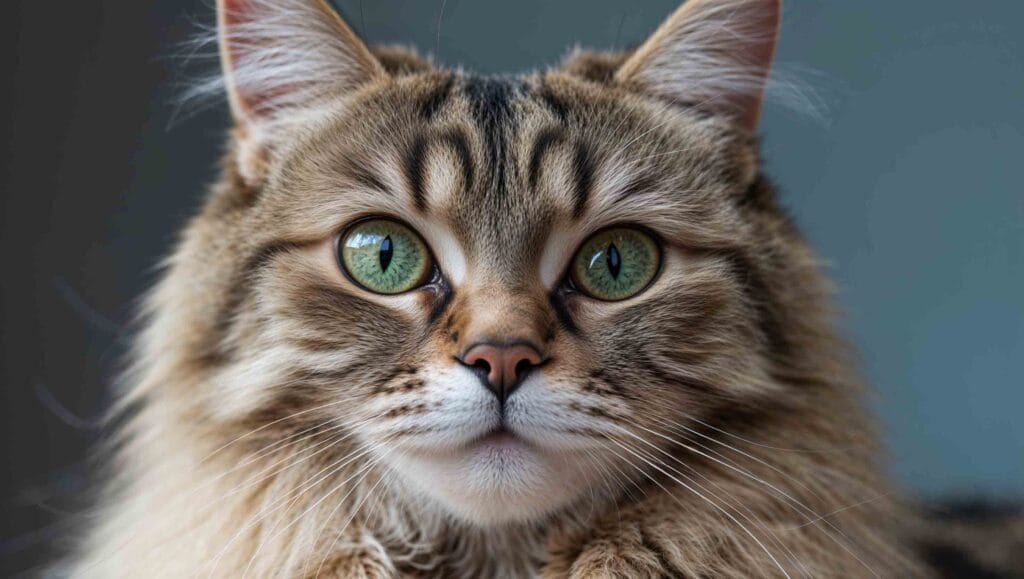Cat lovers Of course you know cats are innocent and playful and that gets them into trouble a lot. The knocking on doors is one of the quirks many cat owners experience.
The behavior can be maddening because your fur baby either paws at the door or pushes objects around making noise. So why would cats do this and what can I do about it?
A cat knocking on your door may eventually become noise. It ruins your work, sleep, or time at home that should be spent quietly.
But if you want to deal with it effectively, you first need to understand why cats behave that way. So, let’s see How to Stop Cats from Knocking on Doors?
The Motivation Behind Door Knocking
Cats are naturally curious. They have the instinct to explore and find out everything else around them.
There are multiple motivations going on when it comes to knocking on doors.
Cats’ Natural Instincts and Curiosity:
Doors are a mystery. They might be just a barrier between a cat and his areas of interest they want to look at the room, but he can’t stay on the counter, so he can’t do it.
Perhaps it’s just their way of pounding the door’s threshold to see what’s on the other side.
Attention-Seeking Behavior:
Cats are very sensitive to their human gestures. If your cat’s attempt to get your attention through knocking resulted in (good or bad) attention in return, your cat will likely continue knocking as a way to get your attention.
Separation Anxiety:
In some cats, door knocking can actually be a sign of separation anxiety. If they are used to keeping close to you, they may even feel isolated when you close those doors.
That knocking could be a cry for attention or a scary cry for help to get back in your good books.
Door Knocking and its effect on your Home Environment
Although a harmless or even endearing behavior among some, door-knocking can have a myriad of undesirable repercussions on your home and on your cat’s well being.
Disruption to Your Daily Routine:
Its constant tapping or scratching at the door can interrupt your work, leisure or rest. If your cat knocks at inopportune hours, say early in the morning, or during an essential meeting, it can be extremely infuriating.
Potential Damage to Doors or Walls:
Persistent knocking can wear the heck out of things when left alone over time.
A cat’s continuing efforts to get through can mean scratches on your doors or furniture, or marks and damage on the walls and door frames.
How Constant Knocking Affects Your Cat’s Behavior:
Unfortunately, if this behavior is ignored or not properly tended to, it only escalates. This behavior may intensify, and your cat may become more persistent so the knocking progresses into other forms of disruptive behavior such as meowing at loud volumes or scratching.
Make it a Stimulating Environment So as to Divert Attention
Door knocking is boring and a common reason. Since cats are an intelligent, active species, when they’re not getting mentally or physically stimulated, knocking can be a way to get them noticed or let out any energy.
Interactive Toys and Puzzles:
Getting your cat to play with toys that test their mind will unwanted behaviors. Instead, try using puzzle feeders, treat dispensing toys or even laser pointers to amuse them away from their door antics!
Vertical Spaces and Climbing Opportunities:
Cats are natural climbers. Attractive shelves, cat trees, or window perches supply some vertical spaces and eliminate the need to figure out what’s behind closed doors.
Engaging Regularly with Your Cat:
If you are sure of the knocking behavior, then you can try to alleviate it by ensuring that your cat is getting enough playtime and bonding moments, that will cut away their need for attention.
A little bit of interactive play every day will go a long way to keep them happy.
You Will Use Positive Reinforcement to Modify Behavior
If you want to train your cat to stop knocking on doors, it can take patience and consistency and positive reinforcement is a good path to take.

The Power of Treats and Praise:
Each time your cat is calm near the door and doesn’t knock, reward them by giving them a treat or telling them they did good.
The idea of positive reinforcement is that your cat will associate base quiet behavior with something desirable and therefore be more likely to repeat it.
Rewarding Calm Behavior and Ignoring the Knocking:
So be sure not to make an issue of giving your cat attention for knocking. Try instead to ignore the behavior and only give attention when your cat is quiet and calm.
Your cat will eventually learn that knocking doesn’t work.
Creating Consistent Patterns:
Cats prefer things to be predictable. Having a consistent plan of what to do when you catch your cat (through play, with treats, or letting your cat be alone) will not only make learning easier for your cat but will make his life a little less stressful.
Establish a Routine: Predictability for Your Cat
There is a vital part played by routine when it comes to the general welfare of your cat. Keeping cats stress free isn’t so much about the mechanics of repairing damage, it’s about creating an environment that makes them feel safe and secure, less inclined to exhibit the anxiety driven behaviors that result in knocking on doors.
How Routine Helps Cats Feel Secure:
Cats are creatures of habit and, given enough time, they will learn that you are reliable and you provide something nice and predictable.
If you feed, play and pay attention to your cat at certain times of the day they do not allow themselves to become stressed by waiting for you and therefore knock on doors which are closed to them.
Having regularity in their environment will make them feel less inclined to seek attention from you by means of disruptive measures.
Setting Clear Boundaries Around Door Knocking:
Have a consistent set of doors you knock on. If you don’t want your cat to knock, make sure they don’t have a tendency to knock at that time (e.g. while you’re working), and if that’s the case, occupy them or provide an area where they cannot reach the door.
Time Management for Play and Attention:
Decide on certain periods of the day when you want to be able to focus, play and interact.
By making sure your cat is tired out and content by bedtime, then you lessen the chances of it knocking during the night.
Preventing Access to Doors: Physical Barriers
If you’ve tried everything to get the knocking to stop but it continues, then you might have to resort to a more drastic method.
This can take the temptation out of your mind completely by preventing access to doors.
Using Door Stoppers or Blocking the Doorway:
The solution is as simple as using a door stopper, or leaving the door cracked open slightly to deter your cat from banging on it.
If you have doors that are prone to getting scratched or knocked you may opt to install a physical barrier or at the very least a door mat to help keep your cat out of that room.
Installing Pet Gates or Barriers:
Limiting your cat’s access to certain areas of the house, including rooms with doors that they have a habit of knocking on, can be an effective way to do this using pet gates or barriers.
Using a “Do Not Disturb” Approach:
If your cat’s knocking is particularly annoying in certain rooms, try shutting the door all the time. In time your cat will get the message that knocking on this door gets her nowhere.
Discouraging Door Knocking: It pays to learn some training techniques.
It takes some patience and consistent work to train your cat to stop knocking. You will be able to change their behavior over time through gentle methods.
Redirecting Attention to Positive Activities:
If your cat begins knocking start redirecting your cat’s attention to another engaging activity like a play session or new toy.
By doing this it can pull their attention away from the door and deter them from knocking.
Using a Gentle “No” to Deter Knocking:
If your cat still keeps knocking, say, without raising your voice, “no,” or “stop.” Don’t shout shouting can startle or stress your cat out. Immediately redirect them into something positive.
Consistent Training Sessions:
Consistency is everything, just like any training. Also, make sure that when your cat knocks you are using the same methods or techniques.
They will eventually start to link the behavior to negative consequences over time.
Addressing Underlying Issues: Anxiety and Stress Management
Door knocking can also be something else as well sometimes in manifestation of separation anxiety or stress as well.
If your kitty seems too anxious or distressed about something it’s probably worth
investigating the cause.
The Connection Between Anxiety and Door Knocking:
Knock on doors as a ccoping mechanisms. Stress may be related to being separated from you or to changes in their environment.
Effective anxiety behavior can be addressed once you know where it comes from.
Solutions for Calming an Anxious Cat:
A number of calming techniques can help an anxious cat, be it a pheromone diffuser, a calming collar or even some medications that a veterinarian may prescribe this.
Make sure your cat has a safe place where they feel secure and don’t trigger other stressful situations.
Professional Help for Severe Anxiety or Behavioral Problems:
If your cat’s anxiety or behavior is particularly bad, you should speak with a veterinarian or an animal behaviorist who can help diagnose and fix your cat.
wrap up on How to Stop Cats from Knocking on Doors?
Patience, consistency and an understanding of a cat’s needs will stop a cat from knocking on doors.
Boredom and anxiety are something that you as a pet owner can help to tame and address with training techniques, ending up with more peace in your house.
Just remember, each cat is unique, and may take a while to work through these steps. You can enjoy a more pleasant living environment with your feline friend with a little time and effort.
See more:
- What B Vitamin is Good for Cats with Allergies?
- Can Cats Eat Dog Food? A Pet Owner’s best solutions
- How to Bring a Cat to a Hotel – expert best review
- How Many Lost Cats Are Reported in a Year? – cats Idea
- How Long Can Cats Be Left Alone? – Expert review
FAQ: How to Stop Cats from Knocking on Doors?
Q1: can you train a cat to not knock things over?
Ans: Yes you can train your cat and engage with busy your cat interactive with toys. This is best solution.
Q2: how to stop cat scratching at door in morning?
Ans: We trimmed your cat nails weekly and this natural behaviour so we cannot ignore but we can reduce noise timing nails.
q3: what scent stops cats from scratching?
Ans: yes cats cats mostly hate lavender and peppermint scent so you can use any thing that time.
